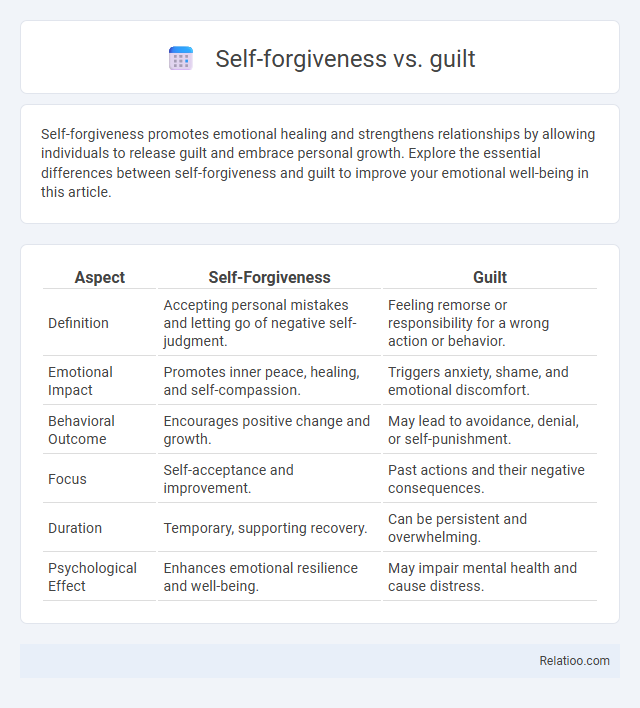Self-forgiveness promotes emotional healing and strengthens relationships by allowing individuals to release guilt and embrace personal growth. Explore the essential differences between self-forgiveness and guilt to improve your emotional well-being in this article.
Table of Comparison
| Aspect | Self-Forgiveness | Guilt |
|---|---|---|
| Definition | Accepting personal mistakes and letting go of negative self-judgment. | Feeling remorse or responsibility for a wrong action or behavior. |
| Emotional Impact | Promotes inner peace, healing, and self-compassion. | Triggers anxiety, shame, and emotional discomfort. |
| Behavioral Outcome | Encourages positive change and growth. | May lead to avoidance, denial, or self-punishment. |
| Focus | Self-acceptance and improvement. | Past actions and their negative consequences. |
| Duration | Temporary, supporting recovery. | Can be persistent and overwhelming. |
| Psychological Effect | Enhances emotional resilience and well-being. | May impair mental health and cause distress. |
Understanding Self-Forgiveness: Definition and Importance
Self-forgiveness is the conscious decision to release resentment and guilt toward yourself for past mistakes, fostering emotional healing and personal growth. Unlike guilt, which often triggers self-punishment and negative self-judgment, self-forgiveness promotes acceptance and compassion that are essential for mental well-being. Understanding self-forgiveness empowers you to break free from harmful cycles and embrace a healthier, more resilient mindset.
The Nature and Roots of Guilt
Guilt arises from recognizing a violation of personal or societal moral standards, often rooted in specific actions or perceived failures that conflict with one's values. It serves as an emotional signal prompting reflection and potential behavioral change but can become maladaptive when internalized excessively or irrationally. Self-forgiveness counters guilt by fostering acceptance and compassion toward oneself, enabling emotional healing and reducing the burden of persistent self-condemnation linked to guilt's nature.
Psychological Effects of Prolonged Guilt
Prolonged guilt can lead to chronic stress, anxiety, and depression, impairing emotional well-being and cognitive functioning. Self-forgiveness facilitates emotional healing by reducing negative self-judgment, fostering resilience, and promoting psychological growth. Distinguishing self-forgiveness from unresolved guilt is crucial for improving mental health outcomes and enhancing overall quality of life.
Self-Forgiveness Vs. Guilt: Key Differences
Self-forgiveness involves acknowledging mistakes, accepting responsibility, and releasing self-blame to promote emotional healing, whereas guilt is an uncomfortable emotional response driven by the recognition of wrongdoing or harm caused. Unlike guilt, which can be persistent and damaging if unresolved, self-forgiveness fosters self-compassion and personal growth by transforming negative feelings into constructive reflections. Understanding these differences is essential for psychological well-being, as self-forgiveness mitigates the harmful effects of prolonged guilt and supports mental resilience.
The Role of Self-Compassion in Self-Forgiveness
Self-compassion plays a crucial role in self-forgiveness by allowing you to treat yourself with kindness rather than harsh judgment when dealing with guilt. Unlike guilt, which often leads to self-punishment, self-forgiveness fosters emotional healing through understanding and acceptance of personal mistakes. Embracing self-compassion facilitates a healthier mindset, promoting psychological well-being and helping you move beyond guilt toward growth and self-improvement.
How Guilt Can Motivate Positive Change
Guilt arises from recognizing mistakes and feeling responsible, which can drive Your motivation to make amends and improve behavior. Self-forgiveness involves releasing harsh self-judgment while maintaining accountability, fostering emotional healing and promoting growth. Distinguishing guilt from self-pity is crucial as guilt encourages constructive change, whereas excessive guilt can lead to stagnation and emotional distress.
Barriers to Self-Forgiveness and How to Overcome Them
Barriers to self-forgiveness often include excessive guilt, shame, and a harsh inner critic that reinforce negative self-perceptions. Overcoming these obstacles requires cultivating self-compassion, reframing past mistakes as learning opportunities, and engaging in therapeutic approaches such as cognitive-behavioral therapy to dismantle unhelpful thought patterns. Recognizing the distinction between healthy guilt, which promotes accountability, and toxic guilt, which hinders healing, is essential for fostering genuine self-forgiveness and psychological well-being.
The Impact of Self-Forgiveness on Mental Health
Self-forgiveness plays a crucial role in improving mental health by reducing feelings of guilt and promoting emotional resilience. Unlike guilt, which often triggers stress and depression, self-forgiveness encourages acceptance and self-compassion, fostering psychological healing. Research indicates that individuals who practice self-forgiveness experience lower levels of anxiety and greater overall well-being.
Practical Steps to Transition from Guilt to Self-Forgiveness
Transitioning from guilt to self-forgiveness involves recognizing and accepting mistakes without harsh self-judgment. Practical steps include mindfulness practices to acknowledge emotions, cognitive reframing to challenge negative beliefs, and compassionate self-talk to foster emotional healing. Consistent application of these strategies promotes emotional resilience and constructive personal growth.
Cultivating a Healthier Mindset: Embracing Forgiveness Over Guilt
Cultivating a healthier mindset involves distinguishing self-forgiveness from guilt by recognizing that guilt often traps you in past mistakes, whereas self-forgiveness promotes emotional healing and personal growth. Embracing forgiveness over guilt shifts your focus from self-punishment to self-compassion, enabling you to break free from negative thought patterns and improve mental well-being. Your ability to practice self-forgiveness fosters resilience, reduces anxiety, and supports a more positive and balanced outlook on life.

Infographic: Self-forgiveness vs Guilt
 relatioo.com
relatioo.com